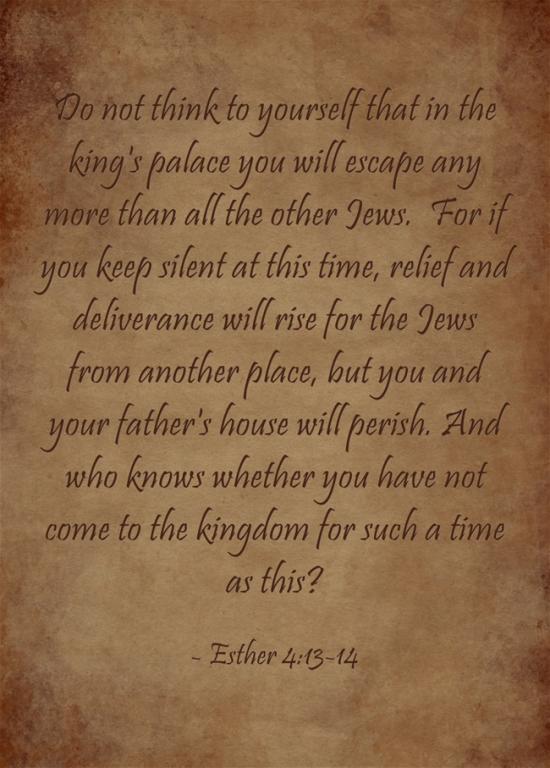Why doesn’t the Book of Esther ever mention God by name?
Silence of God?
The silence of God doesn’t mean the absence of God and so it is in the Book of Esther, where God’s never mentioned by name, but He is inferred in the book because the Jews fasted over their impending extermination and why would they fast if there was no God to fast before? When Mordecai discovered a plot to kill all of the Jews, he informed Queen Esther, who herself was a Jew, and told her that all the Jews were to be wiped out, including her, if she didn’t approach the king about it. Mordecai sent a message to Queen Esther which said, “Do not think to yourself that in the king’s palace you will escape any more than all the other Jews. For if you keep silent at this time, relief and deliverance will rise for the Jews from another place, but you and your father’s house will perish. And who knows whether you have not come to the kingdom for such a time as this?” Then Esther told them to reply to Mordecai” (Esther 4:13-14) so “Then Esther told them to reply to Mordecai, “Go, gather all the Jews to be found in Susa, and hold a fast on my behalf, and do not eat or drink for three days, night or day. I and my young women will also fast as you do. Then I will go to the king, though it is against the law, and if I perish, I perish” (Esther 4:15-16). Esther risked her life but “for such a time as this” did God place Esther in the King’s house and gave her favor in the eyes of King Ahasuerus who “reigned from India to Ethiopia over 127 provinces” (Esther 1:1), showing his kingdom was by far, the greatest power at that time the world knew.
Does it Matter?
It really doesn’t matter why God’s name was never mentioned in the Book of Esther but the fact is, the Book of Esther is canonized and is part of the inspired Word of God, so the Book of Esther is God speaking. He speaks through His written Word, so God is not missing in the Book of Esther because “All Scripture is breathed out by God and profitable for teaching, for reproof, for correction, and for training in righteousness” (2nd Tim 3:16) because “no prophecy of Scripture comes from someone’s own interpretation” (2nd Pet 1:20) and “no prophecy was ever produced by the will of man, but men spoke from God as they were carried along by the Holy Spirit” (2nd Pet 1:21). The author of most of the Psalms, King David, acknowledge Who it was that spoke through him in writing in the psalms; “The Spirit of the Lord speaks by me; his word is on my tongue” (2nd Sam 23:2), so God’s Spirit spoke to him, put the words on his tongue, and he wrote these words down. God speaks through His written Word, the Bible, by means of the authors who were each led by and were under the inspiration of the Spirit of God. My computer did not write this article. My computer was used in the process of writing this but my computer’s processor didn’t come up with the words, purpose, or meaning. I was the literal author, not the computer.
Silence is Irrelevant
The omission of God’s name in the Book of Esther doesn’t mean that God was not moving events behind the scenes because He was obviously working through Queen Esther and had caused her to be placed in the most prominent position there was at that time; that of the Queen to King Ahasuerus who ruled from India to Ethiopia no one could do anything contrary to his decree and he ensured the plot to kill the Jews wouldn’t happen. There was Esther; queen of the most powerful king on earth, and whom God had sovereignly placed and at exactly the right time, just prior to the plot to kill all of the Jews would have been carried out. The Book of Esther is rich in theology, even without God’s proper name being used or referred to. His providence ensured that the Jews would not be extinguished and that the perpetrator of the plot would pay the price.
Conclusion
The Book of Esther is a great historical account but the lessons that we can glean from it are we must speak up at certain times for certain things and can’t remain silent; we must seek God’s will to be done, even if it’s dangerous to do so; and we must believe that the silence of God is not the absence of God. God speaks to us in His written Word, the Bible, so He is never silent and never is absent for all those who have repented and trusted in Christ. For all others, they are still separated from a Holy God by their sins (Isaiah 59:2) and if they refuse to humble themselves, repent of their sins, and put their trust in Christ, God speaks to them too (Rev 20:12-15; 21:8) but in a far different way than He does to the children of God (John 6:37, 39; 10:28-29).
Article by Jack Wellman
Jack Wellman is Pastor of the Mulvane Brethren Church in Mulvane Kansas. Jack is also the Senior Writer at What Christians Want To Know whose mission is to equip, encourage, and energize Christians and to address questions about the believer’s daily walk with God and the Bible. You can follow Jack on Google Plus or check out his book Teaching Children the Gospel available on Amazon.
















